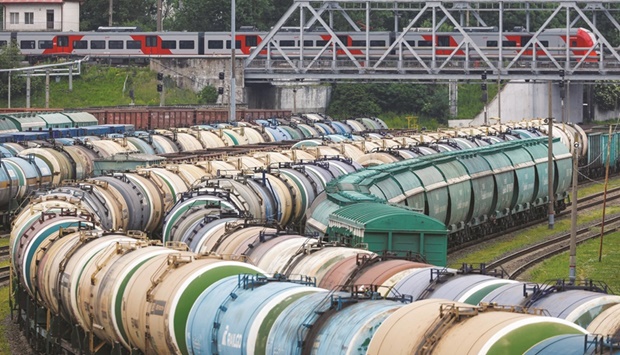Russia threatened yesterday to punish Lithuania with measures that would have a “serious negative impact” for blocking some shipments by rail to Moscow’s Baltic Sea enclave of Kaliningrad, the latest dispute over sanctions imposed over war in Ukraine.
Within Ukraine, Russian forces and their separatist proxies made further advances in the east, pushing towards Lysychansk, now Kyiv’s main bastion in the area of heaviest fighting in the eastern Donbas region that Moscow claims for the separatists.
Ukraine, its forces and weaponry dwarfed by Russia’s, has begged the West to send more and better artillery. Defence Minister Oleksiy Reznikov announced yesterday the arrival of powerful German self-propelled howitzers.
Blaming Western sanctions, Russia has begun pumping reduced volumes of gas to Europe via Ukraine. German Economy Minister Robert Habeck said the diminished flows amounted to an economic attack on Germany that “cannot be allowed to succeed”.
Diplomatic attention has turned towards Russia’s Kaliningrad enclave, a Baltic Sea port and surrounding countryside where nearly a million Russians live, connected to the rest of Russia by a rail link through EU- and Nato-member Lithuania.
Lithuania has shut the route for transport of steel and other ferrous metals, which it says it is required to do under EU sanctions that took effect on Saturday. Russian officials say other basic goods have been blocked too.
Nikolai Patrushev, secretary of Russia’s Security Council, visited the enclave yesterday to chair a security meeting there. He said Lithuania’s actions showed that Russia could not trust the West, which he said had broken written agreements over Kaliningrad.
“Russia will certainly respond to such hostile actions,” Patrushev was quoted as saying by state news agency RIA. “Appropriate measures” were being worked out, and “their consequences will have a serious negative impact on the population of Lithuania”, he said without elaborating.
Lithuanian Prime Minister Ingrida Simonyte said it was “ironic” to hear Russia complain about alleged violations of international law, given that it had violated “possibly every single international treaty”.
Moscow summoned EU envoy Markus Ederer to the Russian Foreign Ministry yesterday. EU spokesperson Peter Stano said Ederer asked the Russians at the meeting “to refrain from escalatory steps and rhetoric”.
The standoff creates a new source of confrontation on the Baltic, a region already set for a security overhaul that would hem in Russia’s sea power as Sweden and Finland apply to join Nato and put nearly the entire coast in alliance territory.
The EU sought to deflect responsibility from Lithuania, saying the policy was collective action by the bloc.
In a symbolic but morale-boosting decision, Ukraine is set to become an official candidate for European Union membership tomorrow, diplomats said.
US Attorney General Merrick Garland became the latest international dignitary to visit Ukraine, affirming yesterday Washington’s commitment to identify, arrest and prosecute those involved in war crimes during Russia’s invasion.
International / US/Latin America
Russia warns Lithuania of ‘consequences’ over blocked rail to enclave

A passenger train moves along a bridge over freight cars, following Lithuania’s ban of the transit of goods under EU sanctions through the Russian exclave of Kaliningrad on the Baltic Sea, in Kaliningrad, Russia, yesterday. (Reuters)
